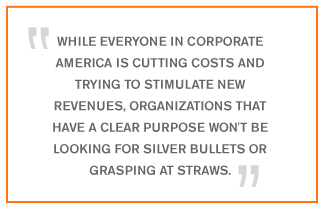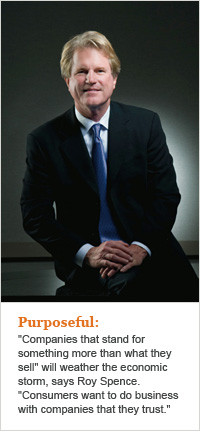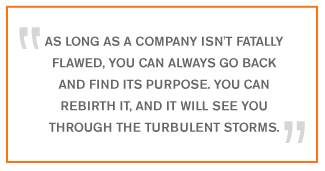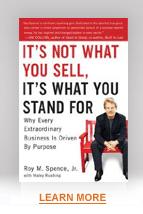What's your company's purpose? To some, that might seem like a pre-recession question, one that no longer resonates when businesses are focusing on survival. Wrestling with questions about purpose might appear to be a luxury reserved for more prosperous times.
Well, it isn't. In fact, it's essential in this climate that you -- and your customers -- understand why your company is in business, says Roy Spence, chairman and CEO of marketing firm GSD&M Idea City in Austin, Texas, and coauthor of It's Not What You Sell, It's What You Stand For.
According to Spence, purpose is not just a crucial differentiator; it's the strategic structure that pulls companies through the worst of times. Companies should determine their purpose -- "a definitive statement about the difference you are trying to make in the world," Spence says -- then craft their leadership, management, operations, strategy, and tactics to further that purpose. What's more, a purpose-based approach simplifies many difficult decisions and makes an uncertain future easier to navigate.
And lest you think that purpose, as Spence defines it, sounds too touchy-feely for a cold, hard business climate, Spence notes that the companies that know and work toward their purpose are frequently the most successful. Purpose is "your reason for being that goes beyond making money, and it almost always results in making more money than you ever thought possible," he writes in It's Not What You Sell, It's What You Stand For.
To prove that point, Spence notes that many of GSD&M's past and present clients -- such as Wal-Mart, the U.S. Air Force, Southwest Airlines, Charles Schwab, and BMW -- are profoundly purpose-driven. All of them know or rediscovered their purpose and use it as a foundation for everything they do. And all of them are remarkably healthy, even amid today's turmoil.
In the following interview, Spence explains why purpose is so relevant during a recession. He discusses how purpose works in some of the world's best companies. And he shows how any company can find, use, and benefit from its purpose -- or reclaim it if it's gone missing -- and why the advantages of that are not incidental.
GMJ: How can a company's purpose help in a recession? And why is the energy expended on it worth it?
Roy Spence: While everyone in corporate America is cutting costs and trying to stimulate new revenues, organizations that have a clear purpose won't be looking for silver bullets or grasping at straws or just cutting cost with no clear focus. Instead, they will have more clarity in their cuts and more certainty on how to stimulate revenues. For example, though Wal-Mart and Southwest Airlines are going through this economic Armageddon like everyone else, they know that all cuts in cost must translate into lower prices so people can live better or into lower airfares so more people can go and see and do things. These are not just cuts for their own sake.
Building your company on purpose is not the only way to be successful. Organizations with an intuitive, not stated, purpose that are fundamentally based upon tremendous management skills and product innovation have survived and thrived. So we're not saying that purpose is the only way to survive and thrive and grow.

It's also important to understand that our discussion about purpose isn't about philanthropy or cause marketing. This isn't the old model of "let's make money and do some charity stuff on the side." We are saying that those companies whose purpose is embedded in the products and services they offer the market will be the only ones that thrive long term. We're going to see through this meltdown that the companies that stand for something more than what they sell will be the survivors, because consumers want to do business with companies that they trust.
GMJ: And making a positive difference is a by-product of that purpose?
Spence: Correct. Let me tell you a story to explain it. In 1971, Herb Kelleher sat in a bar, which was not unusual, in San Antonio, Texas, with a guy named Rollin King. Herb drew a triangle on a napkin -- the triangle from Dallas to Houston to San Antonio. Back then, only 15% of the American public had ever flown. Air travel was reserved for the rich, the elite.
Herb said, "I think we could build a huge company and make a lot of money by somehow getting the fares down and letting businesspeople, in particular, fly instead of drive or ride in a bus. If we can deregulate the market, all of a sudden we could come in with a cost structure that would be lower." So he started his business, Southwest Airlines, with a different business model. His "make a difference" piece was not philanthropic -- it was about making a difference in the marketplace.
When we got the advertising business with Southwest, Herb said, "I've got a big heart, but I'm in the money-making business, the building-a-company business, the airline business." We said, "Herb, you are not in the airline business -- you're in business to democratize the skies. And every decision you made, intuitively or now on purpose, is based on your decision to be in the freedom business. While other airlines are going to restrict the customer, we're going to set the customer free." And he agreed.
GMJ: Is Southwest an exception?
Spence: No. Charles Schwab started his company because he saw that ordinary citizens couldn't get into the stock market. His business model was different, and look what happened. And look at Wal-Mart -- Sam Walton saw that rural people had to either buy really bad crap or pay a lot of money for things that people in bigger towns got for a lot less. So Sam said, "Why can't we let ordinary people buy the same stuff as rich people?" His business model was based on making a difference. It was not philanthropic, but it was different because it made a difference. The intent of all these companies was to build a company to last, but the purpose was to make a difference in the lives of consumers.
GMJ: How does a company's purpose inform its business decisions?
Spence: For twenty-plus years, we had a monthly marketing meeting with Herb Kelleher -- which is rare, and I wish CEOs would do it more often with their marketing and advertising people -- and we got to know the business of the company. We knew that our purpose was to democratize the skies. We knew we were in the freedom business. The only way that we could democratize the skies was to ensure that our cost structure was lower than the competitors'. Every decision that was made was based on that. So we knew that we had to spend our precious money on the things that mattered: safety, airplanes, people, and airport location.
Now we got criticized roundly, as you remember: "Oh, they're just cattle cars. Oh, they don't feed you. Oh, they don't have first class. Oh, you have to stand in line." But Herb kept to his purpose. He said, "People, I'm in the business of democratizing the skies. I can't do it if we have high costs. If something increases our costs, we'll have to increase our fares, and we'll violate the purpose of the airline: democratizing the skies." That's how you make decisions.
GMJ: But what's the difference between purpose and mission?
Spence: I think most organizations confuse purpose and mission and vision. Purpose is the difference you're trying to make. With Southwest Airlines, the purpose is "democratizing the skies." Mission is how you do it. "We democratize the skies by keeping our fares low and our spirits high." Vision is how you see the world after you've done purpose and mission. "I see a world in which everyone in America has the chance to go and see and do things they've never dreamed of. I see a world where everyone has the ability to fly." That's how it all ties together, and that's why purpose trumps everything else.
GMJ: How do you keep your purpose focused on the company's core products when the purpose is as broad as "democratizing the skies"?
Spence: It's always a danger, and Haley [Rushing, with whom Spence wrote It's Not What You Sell, It's What You Stand For] my Chief Purposologist, who's the best in the world at this, cautions that if you get too ethereal, people say, "What are you smoking?" But if you get too narrow, it becomes a tactic.
Purpose must serve creating a demand for your product. Otherwise, you're into cause marketing, which is not what I'm talking about. Purpose must be totally embedded in all that you do. I'm not as familiar with Johnson & Johnson because we don't handle them, but I know that their purpose is to alleviate pain and suffering. That's great! What they do when they're at their best -- every product they develop, every distribution channel they go into, every decision they make at Johnson & Johnson -- is to develop something that will alleviate pain and suffering.
Jim Collins calls purpose the greatest "stop doing" list in the world. If an activity doesn't add value or fulfill your purpose, stop doing it. At some point, everything must work together, and everything must serve the purpose.
GMJ: How does a company determine its purpose -- especially one with many business lines?
Spence: We use a process we call the "purpose flywheel." First is building an organization that makes a difference. Second is creating leaders of great purpose. And third is bringing that purpose to life in the marketplace. To start, we sit down with a CEO -- and this process really is top down, by the way; a lot of things aren't, but this is top down -- and convince him or her that this is important. Purpose drives everything, and the CEO and other top leaders have got to say, "We're into purpose because we truly believe it will sustain and energize and rejuvenate our culture and therefore our sales and profit."
It's important to remember that we are usually on a mission to rediscover -- not discover -- a purpose. When we walk in and have a conversation with the CEO who fesses up that they have lost their way when it comes to "what business are they in and what difference are they trying to make in the lives of their customers," we say that no matter how big or small you are -- no matter how old or young your company -- every organization has a deep and core purpose. Our job is helping rediscover it. It simply could have been painted over, it could have been violated, but it's there; we just have to go search for it and bring it to life again.
Haley has a set of questions to ask -- they're in the book, by the way -- such as, "Why was the company founded? What are the biggest mistakes you've made? What were you doing right when you were the most successful? How did your employees feel?" We ask alumni -- people who have left the company for whatever reason. We ask the customers and the employees. At some point -- and it happens every single time -- a convergence of language and sentiment starts to form. It coalesces into the purpose of an organization.
GMJ: How does a company recognize if its purpose has gotten painted over or violated, and how does it reclaim it?
Spence: There are a couple of signs that this is happening. For example, say a new leader comes in who's in charge of the messaging and the culture, and he decides that everything that came before was pretty stupid, and he doesn't recognize that a lot of good stuff happened before he got there. So he starts making decisions that violate the core purpose of the company.
Then the company starts to lose its fan base and its long-time, loyal employees. You'll see an erosion of margins and customer accounts. All of a sudden, decisions are harder, meetings are longer, arguments are deeper, uncertainty becomes apparent, swagger is lost, and the company is in decline. That's when the company starts grasping for straws, and the end game of losing its purpose is that it loses its relevancy.
But as long as the company isn't fatally flawed, you can always go back and find its purpose. You can rebirth it, and it will see you through the turbulent storms, and it will turn you around. That's what I call the T.S. Eliot strategy: "We shall never cease from exploration/And the end of all our exploring/Will be to arrive where we started/And know the place for the first time." When you do that, purpose starts to drive everything again.
GMJ: What would you recommend to business leaders who are trying to both stay true to purpose and to downsize?
Spence: Cut everything that is "nice but not necessary" to fulfill your purpose. Practice the Golden Rule with your people. Start at the top with salary cuts or freezes. Dial up your purpose in all that you do. Leaders must "fess up when you mess up" and then have a clear path to get through the fog. Don't grasp for straws or look for silver bullets. And finally, use this crisis to start building what you should have been building all along in the good times.
-- Interviewed by Jennifer Robison

